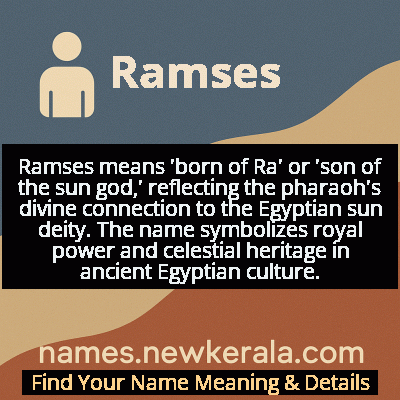Ramses Name Meaning & Details
Origin, Popularity, Numerology Analysis & Name Meaning of Ramses
Discover the origin, meaning, and cultural significance of the name RAMSES. Delve into its historical roots and explore the lasting impact it has had on communities and traditions.
Name
Ramses
Gender
Male
Origin
Egyptian
Lucky Number
3
Meaning of the Name - Ramses
Ramses means 'born of Ra' or 'son of the sun god,' reflecting the pharaoh's divine connection to the Egyptian sun deity. The name symbolizes royal power and celestial heritage in ancient Egyptian culture.
Ramses - Complete Numerology Analysis
Your Numerology Number
Based on Pythagorean Numerology System
Ruling Planet
Jupiter
Positive Nature
Optimistic, inspirational, and creative.
Negative Traits
Scattered, exaggerating.
Lucky Colours
Yellow, gold, purple.
Lucky Days
Thursday.
Lucky Stones
Yellow sapphire.
Harmony Numbers
1, 2, 9.
Best Suited Professions
Arts, writing, communication.
What People Like About You
Creativity, optimism.
Famous People Named Ramses
Ramses II
Pharaoh of Egypt
Ruled for 66 years, built Abu Simbel temples, and established Egypt's golden age
Ramses I
Pharaoh of Egypt
Founded the 19th Dynasty and established a new royal lineage
Ramses III
Pharaoh of Egypt
Successfully defended Egypt against multiple invasions and built Medinet Habu
Ramses XI
Pharaoh of Egypt
Final ruler of the New Kingdom period, marking the end of an era
Name Variations & International Equivalents
Click on blue names to explore their detailed meanings. Gray names with will be available soon.
Cultural & Historical Significance
The name became synonymous with divine kingship, as pharaohs bearing this name were considered living manifestations of the gods, particularly Ra, the sun god. The Ramesside period saw Egypt at its territorial peak, with monumental construction projects like the temples at Abu Simbel, the Ramesseum, and additions to Karnak that still stand as testaments to this golden age. The name evokes images of colossal statues, grand processions, and the absolute power of the pharaoh as both ruler and deity.
Extended Personality Analysis
Individuals named Ramses are often perceived as possessing natural leadership qualities, confidence, and a commanding presence that draws respect from others. They tend to be ambitious, determined, and visionary, with a strong sense of purpose and the ability to inspire those around them. Like their namesake pharaohs, they often exhibit strategic thinking, organizational skills, and the capacity to undertake large-scale projects or lead significant endeavors.
There's also an association with cultural sophistication, appreciation for history and tradition, and a certain regal dignity in their demeanor. They may demonstrate resilience in facing challenges and possess the endurance to see long-term plans through to completion. While sometimes perceived as authoritative or traditional, they typically balance this with diplomatic skills and the wisdom to build lasting legacies rather than seeking only immediate gains.
Modern Usage & Popularity
In modern times, Ramses remains a distinctive and powerful name choice, though it's relatively uncommon outside of Egyptian and Arab communities. It has seen occasional use among parents seeking a name with historical gravitas and cultural depth, particularly those with interest in ancient history or Egyptian heritage. The name maintains a presence in academic circles and among Egyptian families preserving cultural traditions, while also appearing in various forms of media that draw on Egyptian themes. Its usage peaked briefly during the Egyptology craze of the early 20th century and has maintained a steady, if limited, presence since.
Symbolic & Spiritual Meanings
Symbolically, Ramses represents divine kingship, eternal legacy, and the power of civilization. The name evokes the sun's life-giving energy through its connection to Ra, symbolizing illumination, vitality, and cosmic order. It carries connotations of monumental achievement, as the pharaohs bearing this name left behind some of ancient Egypt's most enduring architectural marvels. The name also symbolizes the intersection of human and divine, representing the ideal of leadership that combines temporal power with spiritual significance. It suggests permanence in the face of time's passage, reflecting how the accomplishments of the Ramesside pharaohs have endured for millennia.

